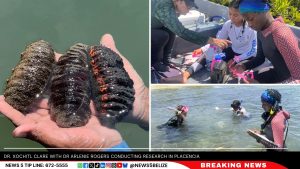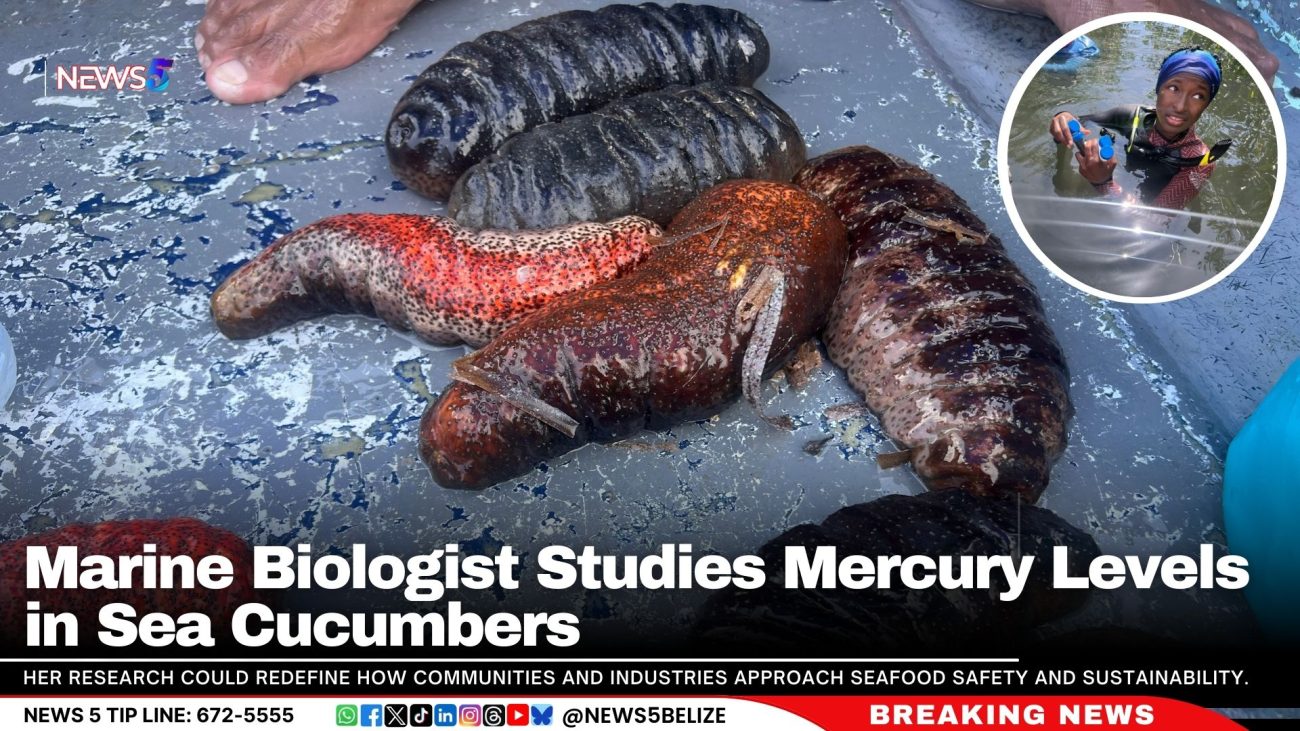Marine Biologist Studies Mercury Levels in Sea Cucumbers
Dr. Xochitl Clare, a Belizean-American marine biologist, is on a mission to uncover how pollution affects one of Belize’s exports—sea cucumbers. Raised in California but deeply connected to her family’s Belize City origins, Dr. Clare returned to Belize last year to combine her academic expertise with her passion for marine biology.
Her research could redefine how communities and industries approach seafood safety and sustainability.
Sea cucumbers are a valuable export to markets in China, Japan, and other Asian countries. “So my work is looking at how pollution, specifically pollutants that are heavy metals like mercury, can impact our seafood, the seafood that we eat here and the seafood that we ship abroad,” Dr. Clare told News 5.
Belize’s sea cucumber fishery reopened on September 1 and will close in January 2025. Following a year-long closure in 2022, a stock assessment conducted by the Belize Fisheries Department and the University of Belize estimated over 249,800 lbs of sea cucumber. To ensure sustainability, the annual harvest quota is capped at 175,000 lbs, distributed among four approved exporters.
Dr. Clare’s work examines the impact of pollution, specifically heavy metals like mercury, on seafood consumed locally and exported abroad. While sea cucumbers are central to her study, her research also encompasses other fish species in the Placencia area.

“So, the reason why Placentia is a great place to do this research is because there is such a great opportunity to work with communities. So first off in doing this work, my first step was to find the communities that would really want to see this work happen. Plasencia is a place that is rapidly growing but is very small that faces a lot of different types of tourism pressures and pressure to deliver to the different tourism markets. So that’s why I’ve collaborated with communities. Here, specifically, non-profit organisations like the Crocodile Research Coalition, work with the Placencia Village Council to get this project off its feet. Aside from collecting actual fish and sea cucumbers to look at the heavy metals inside of the fish, I’m also going to be going and asking people in the community their perceptions on pollution here in Placencia as it pertains to seafood.”
According to Dr. Clare, her aim is to uncover where mercury appears in the environment and at what levels it may pose a risk. “So, mercury is present in our bodies, in our environment, everywhere; it’s just a question of how much and at what level it is safe for us to consume.”
Using a straightforward process of baking samples to identify metallic signatures, Dr. Clare will be able to determine mercury levels in the tissues of the collected animals. “So it’s a very simple process, but the information that we’ll get will be very valuable because it will help us understand where to fish, where to prioritise, and what species might be good.”
Dr. Clare says that the findings will be shared directly with community leaders, such as Placencia Village Chairman Warren Garbutt, to inform decision-making. “So it’s a very simple process, but the information that we’ll get will be very valuable because it will help us understand where to fish, where to prioritise, and what species might be good.”

For instance, if unsafe mercury levels are detected, the information can guide sustainable fishing practices, rather than halting fishing altogether. “It just means that we can start to see, oh, in this specific area, that’s where we might not want to fish so often. For perhaps the reefs or other areas are really great places. That’s what we want to hone in on. The success stories. Because if we find that certain areas are doing really well, we want to keep that going.”
Sea cucumbers are vital to marine ecosystems, often called the “vacuum cleaners of the ocean floor” for their role in consuming detritus, breaking down organic matter, and recycling nutrients. This activity improves sediment health, supports carbon cycling, and helps sustain the balance of coral reef and seagrass habitats.







Facebook Comments